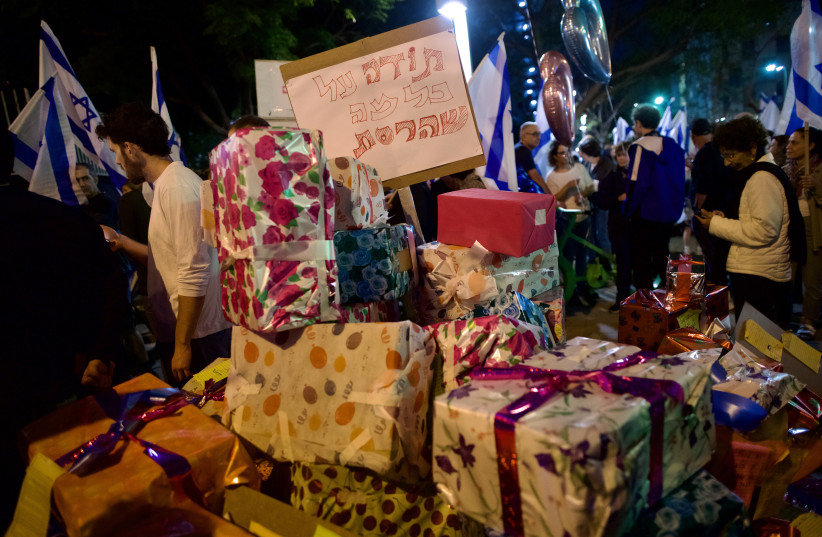A number of incidents occurred at military cemeteries on Remembrance Day on Tuesday, but their scope and extremity were less than what many Israelis feared.
On Independence Day on Wednesday, official ceremonies and events largely passed unhindered. Protest organizers instead held some rallies and carried out creative protest acts.
Some politicians and pundits argued that bloodthirsty media had inflated the concerns out of proportion in the first place. But events and threats leading up to Remembrance Day indicated that the fears were real, and a combination of factors helped lower the flames.
These included a joint call by the prime minister and opposition leaders last week to respect the day’s holiness; similar pleas this week by dozens of institutions and organizations, including from the president and local authority leaders to bereaved family NGOs; some politicians choosing to respect bereaved families’ wishes that they stay away and respectful conduct by those who did attend; and the choice of some bereaved families not to attend the ceremonies.
But above all this, what probably contributed most to the relative quiet was the judicial reform legislation freeze that Prime Minister Benjamin Netanyahu announced at the end of March and the cautiously optimistic voices coming out of the negotiations at the President’s Residence.
In the weeks leading up to Netanyahu’s announcement, National Unity leader Benny Gantz and his party colleague Gadi Eisenkot called for a freeze specifically to avoid tensions spilling over on Remembrance Day and Independence Day, and this proved to be prudent.
Israelis breathed a collective sigh of relief and perhaps even received a dose of optimism for the weeks ahead.
What comes next for Israel's judicial reform battle?
The official legislation freeze ends when the Knesset reconvenes to begin its summer session on Monday. But the coalition is unlikely to continue advancing legislation connected to the judicial overhaul during May. This is because according to law, the Knesset must pass the national budget by May 29. If the budget does not pass on time, the Knesset disperses automatically and a new election is held. The coalition will very likely not be able to promote both the judicial overhaul and the budget at once.
Meanwhile, the coalition has a hot potato it needs to handle – the demand of the haredi (ultra-Orthodox) parties to pass an updated haredi conscription bill by the time the budget passes. The current version of the bill is set to expire with the end of the Knesset’s summer session on July 31.
But the haredi parties are conditioning their support for the budget on this bill, which in short, would lower the blanket exemption for haredi conscripts from the current age of 26 to 21-23. This could lead to a crisis in the coalition, and the judicial reforms would then take a backseat.
This means that negotiations at the President’s Residence are likely to continue under the radar until the end of May. If the sides reach an agreement by then, the Knesset will likely begin by legislating the parts it agrees upon, and this could take another few weeks, leading deep into June.
Protests will likely continue throughout, perhaps with a slightly lower intensity. They could shift to focusing on the draft issue or a number of other issues on the government’s agenda. If the coalition at any time in the next few months tries to push through any of the reform laws, the protests would likely become highly intense very quickly.
In short, the coalition has a lot on its plate, and we can expect relative calm over the judicial reform issue at least until the end of May. The rest of the summer session will then depend on the outcome of the negotiations at the President’s Residence.
If they succeed, the coalition and opposition would jointly pass whatever agreed-upon law they have during June. If not, June or July could mark a return to the highly charged toxicity that the country experienced in March, and Israel could then experience a scorching summer of civil strife.

